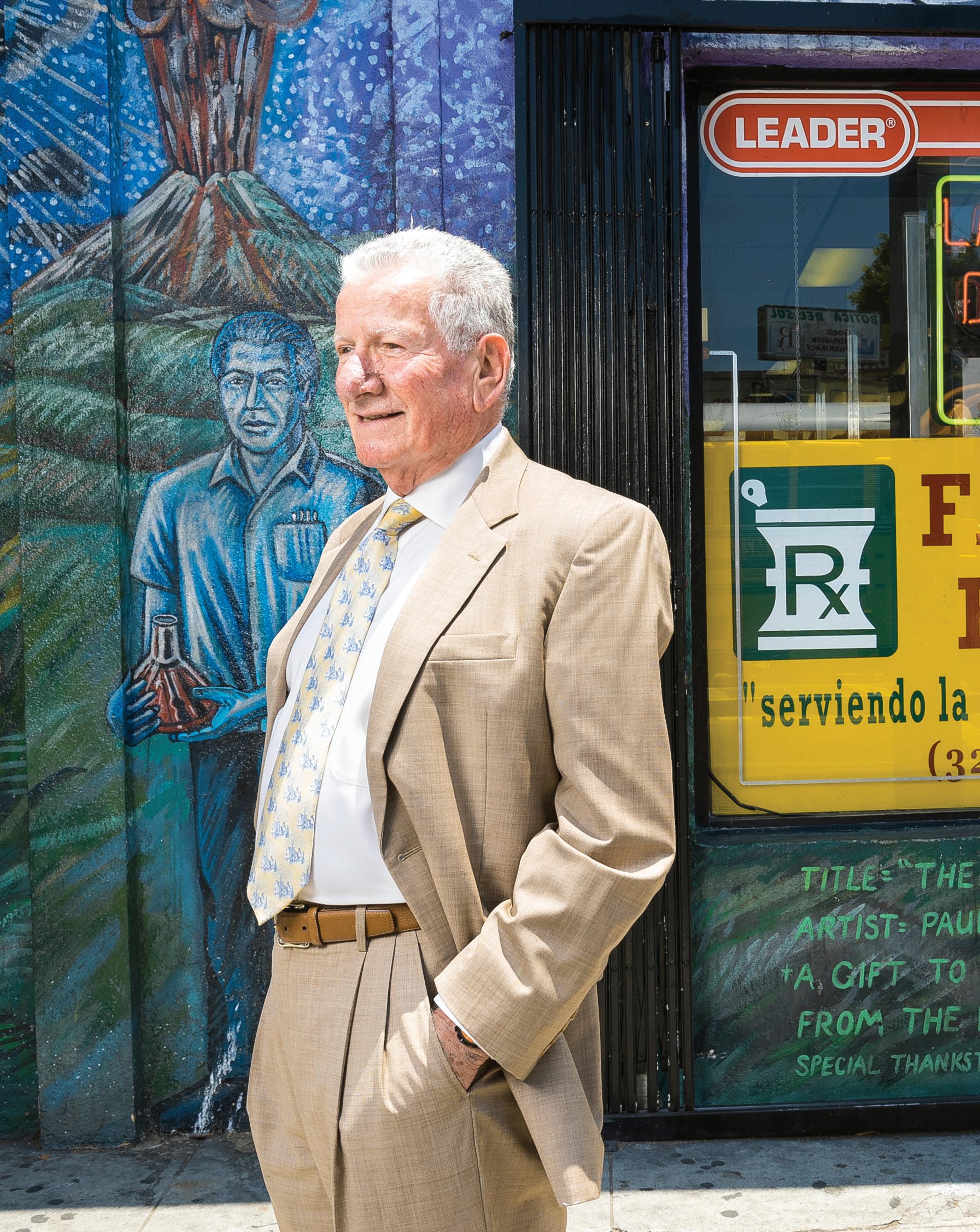
4 minute read
COMING FULL CIRCLE — MEL BARON
BROAD SPECTRUM
Coming Full Circle
Over the past six decades, Professor Mel Baron has served the pharmacy field as an entrepreneur, provider, educator and consultant. Still, his wide-ranging career has always circled back to USC. He grew up near the university’s Health Sciences Campus, enrolled as an undergraduate, earned his doctorate from the School of Pharmacy, became a donor soon afterward and has been a faculty member since 1981.
Yet he nearly took a different path.
His parents’ dream was for him to become a dentist while he wanted to go “away” to college at UCLA. But when his father’s grave illness required him to stay closer to home, Baron found a better fit for his own interests and skills in pharmacy at USC.
“Plus, I have the world’s worst manual dexterity,” he jokes. “I could have set the dental profession back a hundred years.”
From the first day of classes in 1953, as one of the earliest students in the pioneering PharmD program, he knew his chosen direction was the correct one. “I loved it. I was hooked.”
While a student, he worked at a local pharmacy, where he embraced an important lesson from his boss — to keep the “community” in pharmacy. “The owner knew every single person who came in,” he says. “When someone had a baby, he’d go to the hospital to make sure the mother was OK and bring her something. Or he would deliver a prescription on his way home.”
That principle has guided Baron in his practice and in teaching ever since.
During a hospital internship in his final year in the PharmD program, the head pharmacist offered him a partnership in establishing a pharmacy in Van Nuys — one in which Baron prided himself on serving the community. A few years later, he returned to USC for a master’s degree in public administration while continuing to run the pharmacy. Then he stumbled into an opportunity to fill an unmet need — providing highly personalized services and equipment for patients with colostomies and similar prosthetics.
While maintaining the Van Nuys pharmacy, Baron launched an ostomy business and created a facility designed with patient needs in mind — with private fitting rooms as well as large aisles and low shelves to accommodate those in wheelchairs. The company soon had 70 employees and was shipping equipment all over the country, he says. It was purchased by a Fortune 500 company in 1983.
Baron has often found himself in the right place at the right time — and able to recognize a good opportunity when he sees it.
That’s even been true in his personal life. He took a blind date to hear his band, the Meltones, perform at a July 4 party in 1952. “I was smitten,” he recalls. He and his wife, Lorraine — a retired psychologist — recently marked the 65th anniversary of that blind date and will celebrate 64 years of marriage in December. They now have two children, eight grandchildren and 15 great-grandchildren.
Baron’s relationship with the USC School of Pharmacy has lasted nearly as long. After joining the faculty in 1981, he was instrumental in launching the school’s work with safety-net clinics. He became a full-time faculty member in 1990.
“Dr. Baron has always been a leader and innovator,” says Steven Chen, who, in addition to being associate dean for Clinical Affairs and the William A. Heeres and Josephine A. Heeres Chair in Community Pharmacy, was one of the many students inspired by Baron over the decades. “From his pioneering work in community pharmacy to his leading influence in safety-net organizations, he provides a strong voice for health equity for the underserved.”
That voice has made Baron pivotal to the school’s initiatives to enhance the pharmacist’s essential role in healthcare. “We need to think of ourselves in a bigger scope,” he insists. “We have special expertise in medications, but we’re also providers of care. It’s all about improving people’s health.”
According to Chen, who has expanded the school’s safety-net work, “Dr. Baron was the first USC faculty member to notice the tremendous patient care, teaching and scholarship opportunities there.” Those efforts, later bolstered by a $12 million Center for Medicare & Medicaid Innovation grant, have become a national model for improving patient outcomes.
Meanwhile, through his informative and entertaining fotonovelas, Baron’s work has taught countless people in Latino communities about crucial healthcare topics. “We’ve distributed more than half-a-million copies, and they’ve even been translated into Dutch,” Baron says.
His honors include Pharmacist of the Year from the California Pharmacists Association, the American Pharmacists Association Foundation’s Pinnacle Award, induction into the Half Century Trojans Hall of Fame and, most recently, the Lifetime Achievement Award at the School of Pharmacy’s Alumni Awards Gala (see page 20). “But the real reward is seeing all these young people doing such fantastic stuff,” he says of his students. “They inspire me.”
Despite his long tenure, Baron remains as dynamic as ever, teaching, directing the externship program he began in 1981, producing fotonovelas, consulting with safety-net clinics and co-heading the PharmD/MBA program. In July, he received a new USC Good Neighbors grant to develop his next fotonovela, on hypertension. He has no plans to retire.
“I feel a tremendous energy and excitement about what I do,” he says.
« Professor Mel Baron at Ramirez Pharmacy in Boyle Heights, the neighborhood where he grew up









